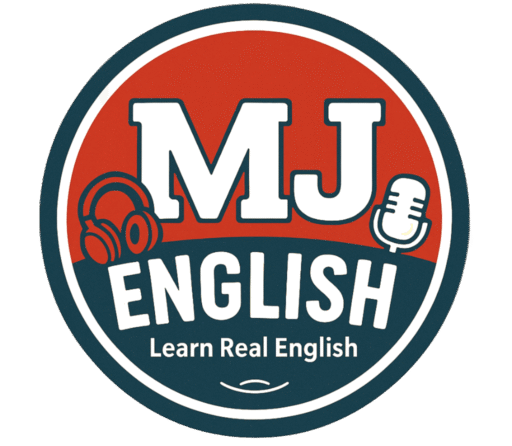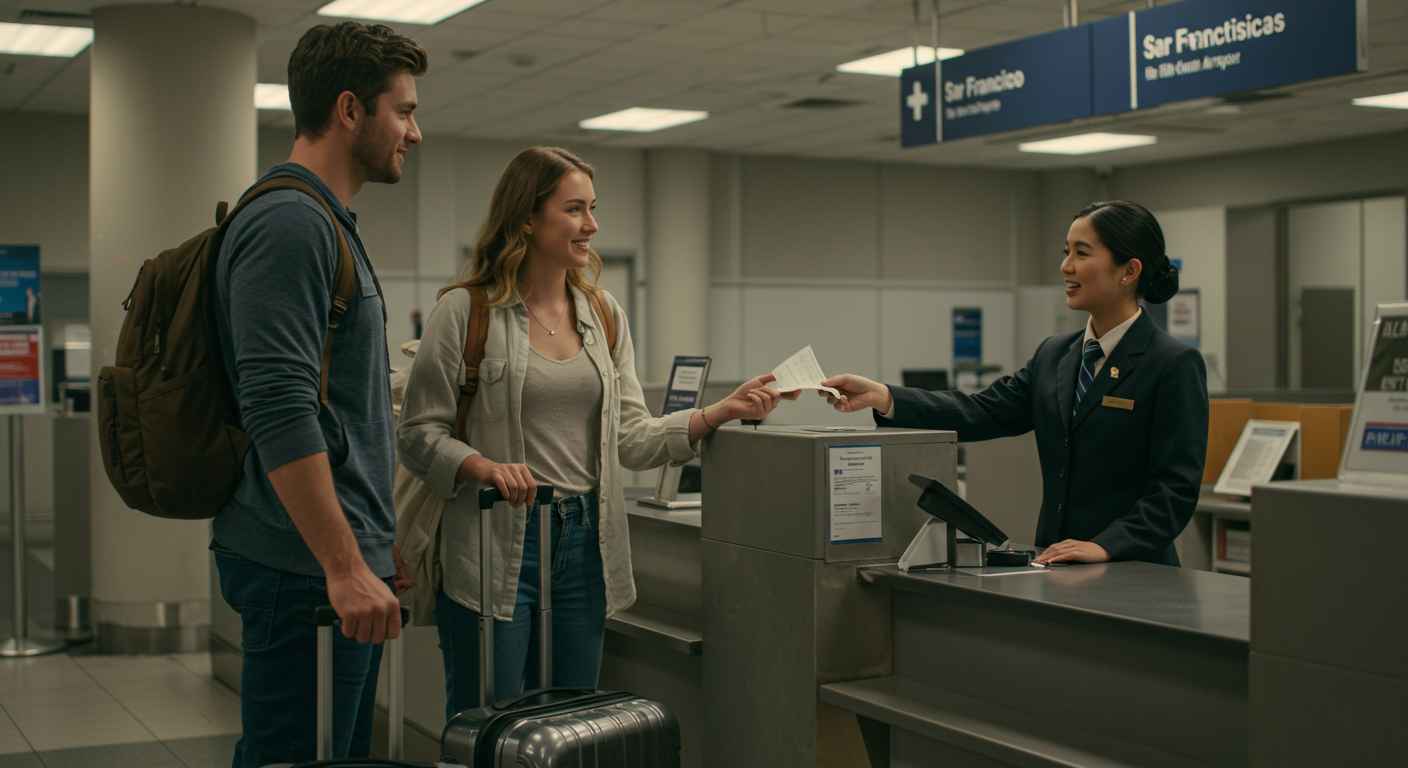到美國旅遊時,很多人會選擇 租車自駕,因為行程更自由。
不過在租車櫃檯、加油站、還車時,都需要用到 實用英文。
今天整理了 自駕的常見對話與句型,
讓你在美國旅行時,可以更自然地和服務人員交談。
🎧Apple Podcast | Spotify
💬 Dialogue — 會話
場景:Tom 和 Alice 在舊金山機場的租車櫃檯。
English Dialogue
Tom: Hi, we’d like to rent a car for three days.
Clerk: Sure. Do you prefer a compact car or an SUV?
Alice: An SUV, please. We have two big suitcases.
Clerk: No problem. Do you need insurance?
Tom: Yes, better to be safe.
Clerk: Okay. Do you also need GPS navigation?
Alice: Yes, please. It makes driving easier.
Tom: By the way, is there a gas station nearby?
Clerk: Yes, it’s just a five-minute drive.
Alice: Great. Do we need to fill up the tank before we return the car?
Clerk: Yes, please. You can drop off the car at the airport office.
Tom: Got it. Thanks for the information.
Clerk: You’re welcome. Have a safe trip!
中文
Tom:你好,我們想租車三天。
店員:好的,你要小型車還是 SUV?
Alice:SUV,謝謝。我們有兩個大行李箱。
店員:沒問題,需要保險嗎?
Tom:要,加保險比較安全。
店員:好,要不要 GPS 導航?
Alice:要,開車會更方便。
Tom:對了,附近有加油站嗎?
店員:有的,開車五分鐘就到。
Alice:太好了!還車前要先加滿油嗎?
店員:要的。你們可以直接在機場辦公室還車。
Tom:了解了,謝謝你的說明。
店員:不客氣,祝旅途平安!
📚 Vocabulary Boost
| 單字 / 片語 | 詞性 | 中文意思 | 英文例句 | 中文翻譯 |
|---|---|---|---|---|
| rent | v. | 租 | We want to rent a car today. | 我們今天要租車。 |
| suitcase | n. | 行李箱 | She carried two heavy suitcases. | 她帶了兩個大行李箱。 |
| insurance | n. | 保險 | It’s better to have insurance. | 有保險比較安心。 |
| GPS navigation | n. | 衛星導航 | The car has GPS navigation. | 車子有導航。 |
| gas station | n. | 加油站 | The gas station is near here. | 加油站就在附近。 |
| fill up the tank | phr. | 加滿油 | Don’t forget to fill up the tank. | 別忘了把油加滿。 |
| drop off | phr. | 歸還 / 放下 | You can drop off the car at the airport. | 你可以在機場還車。 |
| nearby | adv. | 附近 | There’s a shop nearby. | 附近有一家店。 |
| information | n. | 資訊 | Thanks for the information. | 謝謝你的資訊。 |
| safe trip | phr. | 旅途平安 | Have a safe trip! | 祝你旅途平安! |
🔍 Sentence Patterns
| 句型結構 | 中文意思 | 英文例句 | 中文翻譯 |
|---|---|---|---|
| We’d like to + V | 我們想要… | We’d like to rent a car. | 我們想租車。 |
| Do you prefer A or B? | 你要 A 還是 B? | Do you prefer a compact car or an SUV? | 你要小車還是 SUV? |
| It’s better to + V | 做…比較好 | It’s better to take insurance. | 加保險比較好。 |
| By the way, + Q | 對了,…嗎? | By the way, is there a gas station nearby? | 對了,附近有加油站嗎? |
| Do we need to + V? | 我們需要…嗎? | Do we need to fill up the tank? | 我們需要加滿油嗎? |
| You can + V | 你可以… | You can drop off the car at the airport. | 你可以在機場還車。 |
| Thanks for + N | 謝謝… | Thanks for the information. | 謝謝你的資訊。 |
| Have a + adj. trip! | 祝你有個…的旅程! | Have a safe trip! | 祝旅途平安! |
📖逐字稿
J: Hello everyone, and welcome to MJ English.
J:大家好,歡迎來到 MJ English。
M: Great to be here.
M:很高興來到這裡。
J: So, you know, lots of people love traveling, especially to the US, right? And renting a car gives you so much freedom.
J:你知道,很多人喜歡旅行,尤其去美國對吧?而且租車能讓你有超大的自由度。
M: Absolutely, see the sights at your own pace.
M:完全同意,可以照自己的步調看風景。
J: Exactly. But sometimes, talking at the rental counter or the gas station, it can be a bit tricky if you’re not used to the phrases.
J:沒錯。不過有時候,嗯,在租車櫃台或加油站溝通,如果不熟悉用語,會有點棘手。
M: So today we want to cover some really practical English. You can use in those situations.Just make things smoother.
M: 今天我們要來教一些非常實用的英文,可以在這些情境中派上用場,讓事情進行得更順利。
M: Yeah, definitely. Knowing just a few key phrases can honestly make your trip feel, well, less stressful and more fun. It’s about feeling confident when you interact with people.
M:對,真的只要會幾個關鍵片語,就能讓旅程更輕鬆、更有趣。重點是跟人互動時會更有自信。
J: Okay, so to start, we’ve got a short dialogue. It’s between Tom and Alice who are renting a car and the clerk.
J:先來一段短對話。是湯姆、愛麗絲跟租車櫃台人員之間的對話。
Tom 和 Alice 在舊金山機場的租車櫃檯。
Tom: Hi, we’d like to rent a car for three days.
Clerk: Sure. Do you prefer a compact car or an SUV?
Alice: An SUV, please. We have two big suitcases.
Clerk: No problem. Do you need insurance?
Tom: Yes, better to be safe.
Clerk: Okay. Do you also need GPS navigation?
Alice: Yes, please. It makes driving easier.
Tom: By the way, is there a gas station nearby?
Clerk: Yes, it’s just a five-minute drive.
Alice: Great. Do we need to fill up the tank before we return the car?
Clerk: Yes, please. You can drop off the car at the airport office.
Tom: Got it. Thanks for the information.
Clerk: You’re welcome. Have a safe trip!
中文
Tom:你好,我們想租車三天。
店員:好的,你要小型車還是 SUV?
Alice:SUV,謝謝。我們有兩個大行李箱。
店員:沒問題,需要保險嗎?
Tom:要,加保險比較安全。
店員:好,要不要 GPS 導航?
Alice:要,開車會更方便。
Tom:對了,附近有加油站嗎?
店員:有的,開車五分鐘就到。
Alice:太好了!還車前要先加滿油嗎?
店員:要的。你們可以直接在機場辦公室還車。
Tom:了解了,謝謝你的說明。
店員:不客氣,祝旅途平安!
J: Okay. Pretty useful conversation there, right? Covers a lot of common ground.
J:好,這段對話很實用吧?涵蓋了很多常見情境。
M: Definitely. Let’s maybe break down some of the key words and phrases used there. Make sure everyone understands them clearly.
M:真的。我們來拆解一下裡面的關鍵單字和片語,讓大家更清楚。
J: Good idea. Where should we start? How about “rent”?
J:好主意。從哪裡開始?「rent」如何?
M: Okay, “rent.” It’s a verb. Basically, it means to pay money to use something for a limited time. Like in the dialogue, “we want to rent a car today.”
M:好,「rent」是動詞,基本上就是「付錢在一段時間內使用某物」。像對話裡說的「we want to rent a car today」。
J: Right. You’re not buying it, just borrowing it for a fee.
J:沒錯,你不是買下來,而是付費「借用」。
J: Okay. Next one they mentioned was “suitcase.”
J:好。下一個是「suitcase」。
M: Yes. “Suitcases.” Essential for travel. It’s a noun. Just means, you know, the bag you pack your clothes in.
M:對,「suitcase」旅行必備,名詞,意思就是裝衣物的「行李箱」。
J: Like Alice said, we have two big suitcases, explaining why they needed a bigger car, an SUV.
J:就像愛麗絲說的,我們有兩個大行李箱,所以需要更大的車——休旅車。
M: Exactly. Then there was “insurance.” That came up, too.
M:沒錯。接著是「insurance」也有出現。
J: The clerk asked, “Do you need insurance?” What is that exactly?
J:櫃台問「需要保險嗎?」那確切是什麼?
M: Well, “insurance” is, protection you buy. You pay some money and if something bad happens, like an accident, the insurance company helps pay for it.
M:所謂「保險」就是你買的一種保障。你先付費,如果發生意外等狀況,保險公司會協助理賠。
J: So Tom says, “Yes, better to be safe.” It gives you peace of mind.
J:所以湯姆說「要,安全比較重要」。這會讓人比較安心。
M: It can, yes. Then “GPS navigation.”
M:通常會的。然後是「GPS navigation」。
J: The life saver.
J:救命小幫手。
M: Totally. It’s that system, often on a screen in the car, that tells you how to get places. Shows you the map, gives directions.
M:真的。就是車上的系統/螢幕,會導航、顯示地圖並提供路線。
J: Alice says, “It makes driving easier,” which is very true, especially in a new place.
J:愛麗絲說「這讓開車更容易」,非常正確,尤其在不熟的地方。
M: Okay, how about “gas station”?
M:好,那「gas station」。
J: Pretty straightforward, I think. The place you buy fuel for the car.
J:應該很直觀,就是幫車子加油的地方——加油站。
M: Tom asks, “Is there a gas station nearby?” “Nearby” just means close, not far away.
M:湯姆問「附近有加油站嗎?」這裡的「nearby」就是「附近、不遠」。
J: Got it. And connected to that is the phrase, “fill up the tank.”
J:了解。跟這個相關的片語是「fill up the tank」。
M: Right. So, the “tank” is where the car holds the gas. “Fill up the tank” means to put gas in until it’s completely full.
M:對。「tank」是油箱;「fill up the tank」就是把油加到滿。
J: Like the clerk said they needed to do before returning the car.
J:就像櫃台說的,還車前要把油加滿。
M: Which brings us to “drop off.”
M:接著是「drop off」。
J: To return the car, right.
J:就是「歸還(車子)」,對吧。
M: Yeah, it’s a phrasal verb. It means to leave something or someone at a particular place. So, “you can drop off the car at the airport office.” Just means return it there.
M:對,這是片語動詞,意思是把東西/人放在指定地點。所以「you can drop off the car at the airport office」就是到機場辦公室(櫃台)還車。
J: And nearby, you already mentioned that one, means close.
J:還有「nearby」,剛剛提過,就是「附近」。
M: Like, “Is there a shop nearby?”
M:比如「附近有商店嗎?」
J: And “information”?
J:那「information」呢?
M: Tom says, “Thanks for the information.”
M:湯姆說「Thanks for the information」。
J: Just means facts or details about something. Pretty basic but very useful word.
J:意思是「相關資訊/詳細資料」。很基本但超實用。
M: And the very last thing the clerk says is “safe trip.”
M:最後櫃台說的是「safe trip」。
J: Yeah. A really common and nice way to wish someone well when they’re going on a journey. “Have a safe trip.”
J:對,這是很常見又貼心的祝福用語:祝你旅途平安(Have a safe trip)。
M: Simple and friendly.
M:簡單又有禮貌。
J: Okay, that’s some good vocabulary. What about, uh, sentence patterns? I noticed a few useful structures in there.
J:好,單字說到這。那句型呢?我注意到幾個很實用的結構。
M: We can look at those. For example, the clerk asks, “Do you prefer A or B?”
M:我們來看一下。比如櫃台問:「Do you prefer A or B?」
J: Right, like “Do you prefer a compact car or an SUV?” That’s great for asking about choices.
J:對,像是「你偏好小型車還是休旅車?」這很適合用來詢問選項。
M: You can use it for lots of things. “Do you prefer coffee or tea?” “Do you prefer morning or evening?” Very useful.
M:很多情境都能用。像「你喜歡咖啡還是茶?」、「你偏好早上還是晚上?」非常實用。
J: Okay, what else? Tom says, “It’s better to plus V,” V meaning the verb.
J:好,還有呢?湯姆用到「It’s better to + 動詞」。
J: “It’s better to be safe,” he said about insurance. It’s a good way to give advice or say what you think is a good idea.
J:他在談保險時說「It’s better to be safe」。這個句型很適合給建議或表達「這樣做比較好」。
M: Like, “It’s better to book in advance, maybe.”
M:例如:「也許提早訂比較好。」
J: Perfect example.
J:完美範例。
M: Then Alice asks, “Do we need to plus V?”
M:接著愛麗絲問「Do we need to + 動詞?」
M: “Do we need to fill up the tank?” She’s asking if it’s required, if it’s necessary.
M:像「我們需要把油加滿嗎?」就是在問是否「必須/有沒有規定」。
J: Precisely. You use this to ask about rules or obligations. “Do we need to check out by 11,” for example.
J:沒錯。這用來詢問規定或義務。比如「我們需要在 11 點前退房嗎?」
M: Very handy.
M:很好用。
J: Okay, two more quick ones. “Thanks for plus N,” N meaning a noun.
J:好,再兩個快速的。「Thanks for + 名詞」。
M: Tom uses this. “Thanks for the information.” It’s just a polite way to say thank you for something specific.
M:湯姆用了「Thanks for the information」。就是針對某件事表達感謝的禮貌說法。
J: Like, “Thanks for your help” or “thanks for the directions.”
J:例如「謝謝你的幫忙」或「謝謝你指路」。
M: And the last one we already touched on. “Have a plus adjective,” adj means “adjective.”
M:最後一個我們剛提過:「Have a + 形容詞」。
J: “Have a safe trip,” like the clerk said.
J:像櫃台說的「Have a safe trip」。
M: Right. You can change the adjective. “Have a wonderful trip,” or “have a great trip.” It’s just wishing someone well on their journey.
M:對,可以換形容詞:「Have a wonderful trip」、「Have a great trip」,都是祝福人旅途順利的用法。
J: Nice. So, just by practicing these words and, you know, these sentence patterns, you can feel a lot more prepared.
J:不錯。所以只要練習這些單字跟句型,你就會有充分準備的感覺。
M: It really takes the edge off knowing you can handle those basic interactions.
M:知道自己能應付基本溝通,真的能減輕很多緊張感。
J: Makes the whole travel experience smoother.
J:會讓整個旅行體驗更順暢。
M: Thanks everyone for tuning into MJ English today.
M:感謝大家今天收聽 MJ English。
J: Hope it was helpful. See you next time.
J:希望對你有幫助。下次見。
✅ Quick Check 小測驗
📌 延伸閱讀建議
- 【英文生活必學】美國租車實用英文句子
- 【英文旅遊攻略】旅行中問路的常用英文



